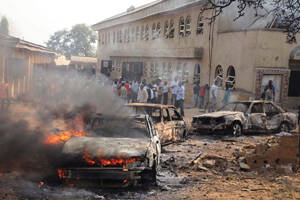As the new year began in Nigeria, a state of emergency was declared, and heavily armed troops and tanks patrolled the streets of the capital of Borno State, Maiduguri, in the nation’s northeast. President Goodluck Jonathan imposed emergency measures throughout the country’s northeast, the conflict-prone central city of Jos and part of Niger State near Abuja and ordered northern borders closed. The emergency decrees came in response to four days of bombing attacks around Christmas that killed and wounded hundreds, including a suicide bombing that claimed the lives of at least 37 people at the Church of Santa Teresa in Abuja, the federal capital.
The president said on state-run television that his aim was to restore security, but many are questioning the government’s capacity or even willingness to respond to the security threat posed by Islamic extremists from the Boko Haram sect. Cardinal Anthony Olubunmi Okogie of Lagos said the spate of bombings makes people wonder “what the government is doing with our money. If they cannot protect the lives of its citizens, then why do we have a government?
“People have identified themselves as members of Boko Haram, taking credit for bombings; still, nothing is done to them. That means the killings [could] continue,” he said; it seemed that “anybody can just do anything they like and go scot free.”
In Abuja, Archbishop John Olorunfemi Onaiyekan said the quick arrest of those responsible for the bombings would renew people’s confidence in the government and its ability to guarantee their security. He urged Nigerian Muslim leaders to assist security agents in exposing those responsible, “as they are giving Islam a bad name.’’
Boko Haram’s campaign to stir up sectarian conflict in Nigeria, an oil-rich nation on Africa’s west coast with large Muslim and Christian populations evenly divided between north and south, appears to be succeeding, at least rhetorically. The Christian Association of Nigeria, which includes Catholics, said in an open letter to President Jonathan that the Christmas bombings were “a declaration of war on Christians and Nigeria as an entity.” The group warned that if the attacks continued in 2012 and “Christians remain unprotected by the security agencies, then we will have no choice but to...take our own steps to ensure our safety and security.”
Mujahid Dokubo-Asari, a Muslim convert and onetime rebel leader from Nigeria’s mostly Christian south, said southern Nigerians could take up arms to fight Boko Haram extremists in the north and are holding back only out of respect for the president. He said such a development was “seconds away... Nigeria is on the precipice of a civil war.”
On Jan. 2, an ultimatum issued by a Boko Haram spokesperson gave Christians residing in the north three days to leave and urged Muslims living in the south to return north as there was “evidence they would be attacked by Christians.”
President Jonathan has met with Muslim and Christian leaders in an attempt to restore calm. One of the country’s leading Muslim clerics, the sultan of Sokoto, Muhammad Sa’ad Abubakar III, said after a meeting with Jonathan on Dec. 27 that the violence was not religious in nature. “It is a conflict between evil people and good people,” he said. “The good people must come together to defeat the evil ones.”








